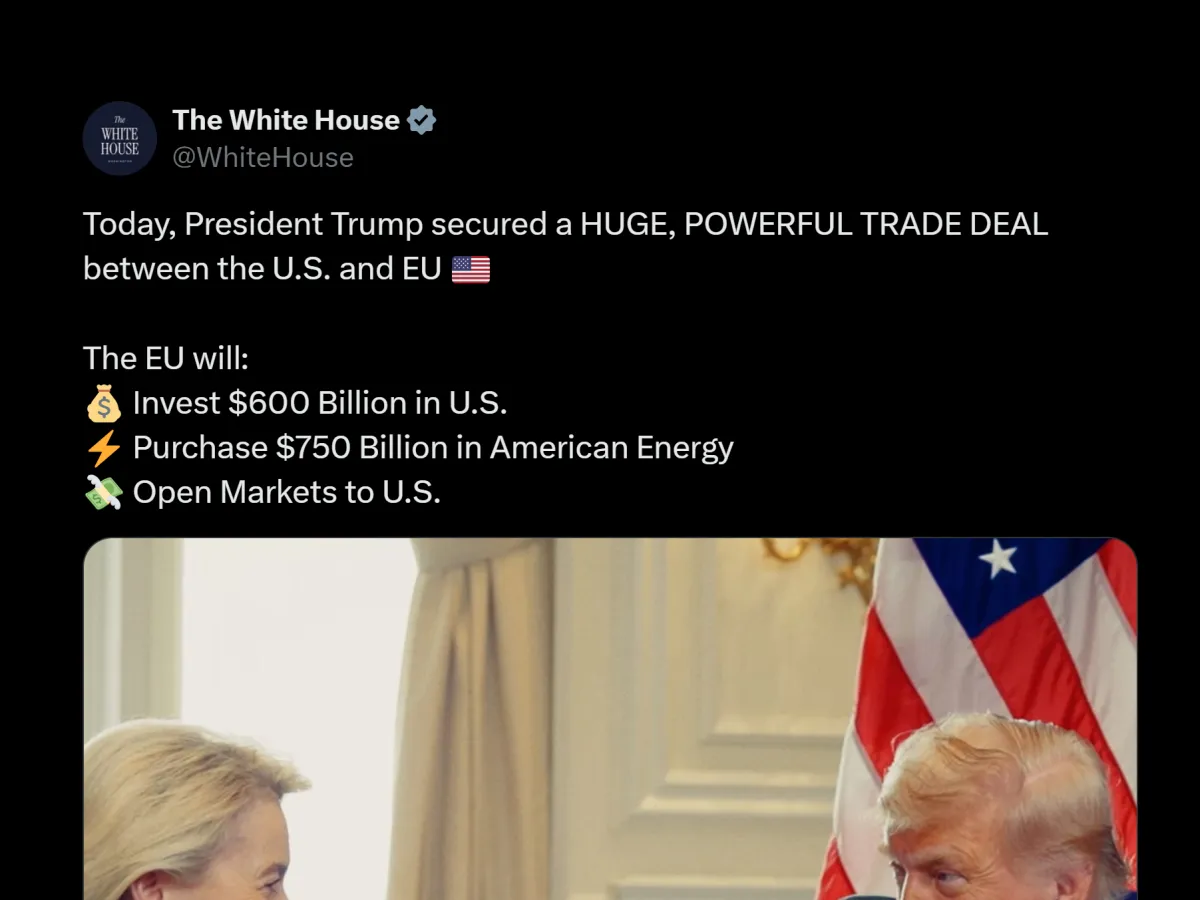Die EU hat einen Deal mit Trump ausgehandelt, der von beiden Seiten als "großer" Erfolg (big deal) präsentiert wird, um den 30%-Zoll der ab August von Trump angedroht war, abzuwenden.
Konkret wird der US-Zollsatz auf EU-Produkte 15% betragen, wobei es Ausnahmen für die USA strategisch wichtige Produkte wie Flugzeugteile und gewisse Rohstoffe, die die USA von der EU benötigen, geben wird. Europäischer Stahl wird hingegen mit 50% verzollt.
Umgekehrt führt die EU keine weiteren Zölle ein, der Zollsatz der EU soll umgekehrt bei Autos auf 2.5% gesenkt werden. Wie viel Zoll die EU auf USA Produkte einheben wird, wird übrigens in den Mainstream-Medien nicht transparent kommuniziert. Der Zollsatz dürfte auf EU-Seite nicht allzu groß sein, gewichtet so um die 1-3%, wobei der Zoll auf US-Autos von 10% auf 2.5% gesenkt werden soll.
Weiters verpflichtet sich die EU zu Energiekäufen von den USA in der Höhe von 750 Milliarden (LNG) und 600 Milliarden in die USA zu investieren (vermutlich in Form von Waffenkäufen).
Insgesamt kommt mir der Deal aus EU-Sicht nicht besonders fair vor, sondern wirkt eher wie ein Kniefall vor Trump, obwohl die USA und EU, wenn man digitale Dienstleistungen miteinbezieht, eine relativ ausgeglichene Handelsbilanz haben.
Auch die Investionsverpflichtungen in die USA sehe ich kritisch. Die EU sollte, wenn sie schon aufrüsten möchte, möglichst in europäische Waffensysteme investieren, um die eigene Wirtschaft zu unterstützen und sich militärisch nicht von anderen Staaten abhängig machen.
Aus Sicht der USA dürfte der Deal tatsächlich ein Verhandlungserfolg für Trump sein. 1:0 für Trump.
Die Frage ist wie nachhaltig dieser Deal sein wird und ob dadurch nicht auch das Vertrauen zwischen US-Verbündeten beschädigt wird, was sich langfristig auch negativ auf die USA auswirken kann.
Was meint ihr? Guter oder schlechter Deal? Für wen?
Reactions

https://x.com/WhiteHouse/status/1949624349134115255
https://x.com/marcfriedrich7/status/1949651981649277358
https://x.com/niklasoestberg/status/1949578566812795370
https://x.com/BeaBovary/status/1949527224740188390
https://x.com/studentofcycles/status/1949705628777099579
https://x.com/SeibtNaomi/status/1949510361658314805
https://x.com/FT/status/1949562815330603297
Weighted EU tariffs about 1-3%
EU to lower tariffs on US cars to 2.5%
English
The EU has negotiated a deal with Trump that is being presented by both sides as a “big deal” in order to avert the 30% tariff that Trump had threatened to impose from August onwards on the EU.
Specifically, the US tariff rate on EU products will be 15%, with exceptions for products of strategic importance to the US, such as aircraft parts and certain raw materials that the US needs from the EU. European steel, on the other hand, will be subject to a 50% tariff.
Conversely, the EU will not introduce any further tariffs, and the EU tariff on cars will be reduced to 2.5%. Incidentally, the mainstream media in Europe is not communicating transparently how much tariff the EU will levy on US products. The tariff rate on the EU side is said to be not very high, weighted at around 1-3%, with the tariff on US cars to be reduced from 10% to 2.5%.
Furthermore, the EU has committed to purchasing energy from the US worth 750 billion (LNG) and investing 600 billion in the US (presumably in the form of arms purchases).
Overall, from the EU's point of view, the deal does not seem particularly fair to me, but rather seems like bending the knee to Trump, even though the US and the EU have a relatively balanced trade balance when digital services are included.
I also view the investment commitments from the EU in the US critically. If the EU wants to rearm, it should invest in European weapons systems if possible in order to support its own economy and not become militarily dependent on other states. The US is doing the same.
From the US perspective, the deal is likely to be a negotiating success for Trump. 1:0 for Trump.
The question is, however, how sustainable this deal will be and whether it will rather damage trust between US allies, which could also have a negative impact on the US in the long term.
What do you think? Good deal or bad deal? For whom? Why not have the same tariffs on both sides?